-
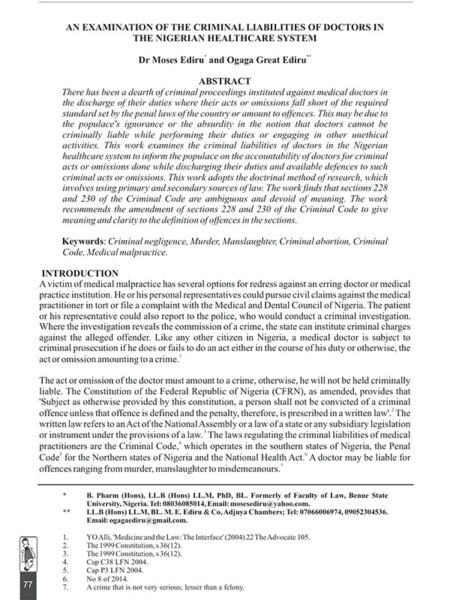
An Examination of the Criminal Liabilities of Doctors in the Nigerian Healthcare System
0₦2,500.00Dr Moses Ediru, formerly of Benue State University, and Ogaga Ediru in their article, An Examination of the Criminal Liabilities of Doctors in the Nigerian Healthcare System, comprehensively examine the criminal liabilities of doctors and how doctors could be made accountable for criminal acts or omissions done while discharging their duties. The authors consider liability for criminal negligence, murder, manslaughter, illegal abortion, and offences under the National Health Act. They also consider defences that are available to a doctor.
-
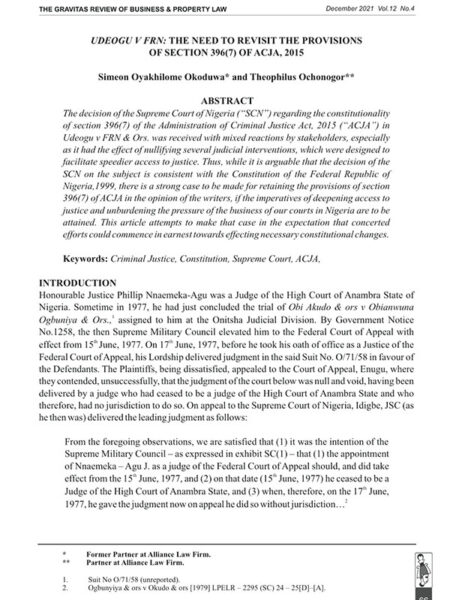
Udeogu v FRN: The Need to Revisit the Provisions of Section 396(7) of ACJA 2015
0₦2,500.00Simeon Okoduwa and Theophilus Ochonogor of the Alliance Law Firm, in their article, Udeogu v FRN: The Need to Revisit the Provisions of Section 396(7) of ACJA 2015, note that the decision of the Supreme Court which declared section 396(7) of ACJA, 2015 as inconsistent with the 1999 Constitution and therefore void needs to be revisited. The Section provides that a Judge of the High Court who has been elevated to the Court of Appeal shall have dispensation to continue to sit as a High Court Judge to conclude any part-heard criminal matter pending before him at the time of his elevation. Okoduwa and Ochonogor argue that if the imperatives of deepening access to justice and unburdening the pressure of the business of courts are to be attained, the Section needs to be retained.
-
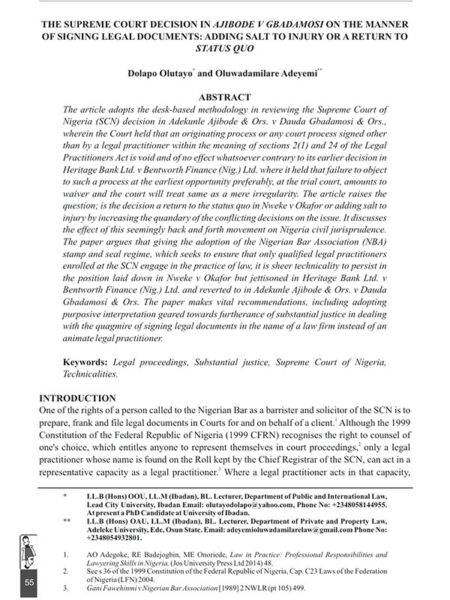
The Supreme Court Decision in Ajibode v Gbadamosi on the Manner of Signing Legal Documents: Adding Salt to Injury or a Return to Status Quo
0₦2,500.00Dolapo Olutayo of the Lead City University and Oluwadamilare Adeyemi of Adeleke University, in their article, The Supreme Court Decision in Ajibode v Gbadamosi on the Manner of Signing Legal Documents: Adding Salt to Injury or a Return to Status Quo, review the decision of the Supreme Court that an originating process or any court process signed other than by a legal practitioner is void and of no effect. The decision in Ajibode is contrary to the Supreme Court’s earlier decision in Heritage Bank v Bentworth where it held that failure to object to such a process at the earliest opportunity amounts to waiver, and the court will treat same as a mere irregularity. Olutayo and Adeyemi raise the question: is Ajibode a return to the status quo of Nweke v Okafor or only adds to the quandary of conflicting decisions on the issue?
-
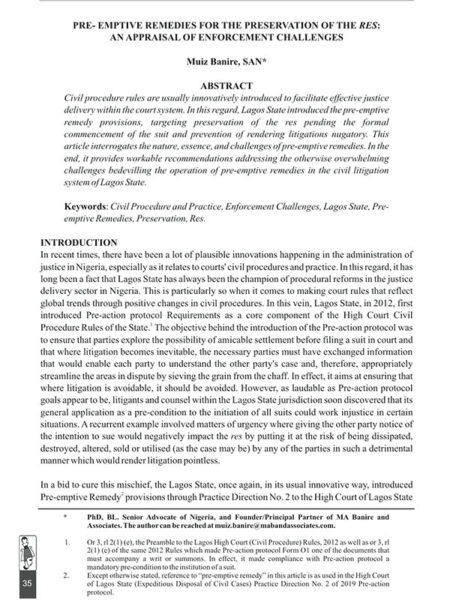
Pre-Emptive Remedies for the Preservation of the Res: An Appraisal of Enforcement Challenges
0₦2,500.00Dr Muiz Banire, SAN, Principal Partner of MA Banire and Associates, in his article, Pre-Emptive Remedies for the Preservation of the Res: An Appraisal of Enforcement Challenges, notes that the Lagos High Court (Civil Procedure) Rules 2012 introduced the pre-emptive remedy provisions, targeting preservation of the res pending the formal commencement of a suit and to prevent rendering litigations nugatory. Dr Banire interrogates the nature, essence, and challenges of pre-emptive remedies and provides workable recommendations addressing the challenges bedevilling the operation of pre-emptive remedies in the civil litigation system.
-
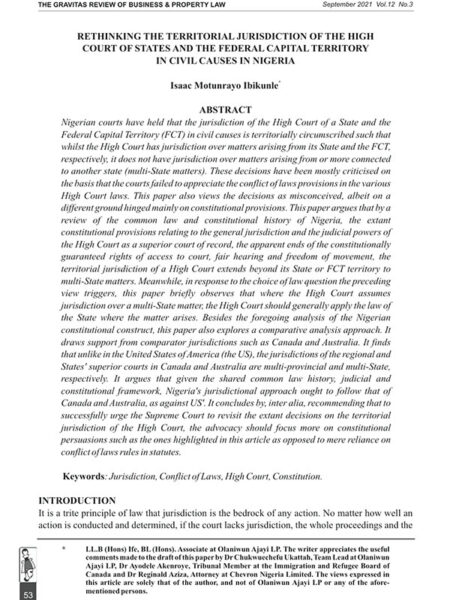
Rethinking the Territorial Jurisdiction of the High Court of States and the Federal Capital Territory in Civil Causes in Nigeria
0₦2,500.00Isaac Ibikunle, Associate at Olaniwun Ajayi LP, in his article, Rethinking the Territorial Jurisdiction of the High Court of States and the Federal Capital Territory in Civil Causes in Nigeria, notes that the extant position of Nigerian courts is that a State High Court does not have jurisdiction over matters arising from or more connected to another state (multi-State matters). He argues that this stance has been criticised because the courts failed to appreciate the conflict of laws provisions in the various High Court laws. From a review of the common law and constitutional history of Nigeria, Ibikunle opines that the territorial jurisdiction of a High Court should extend beyond its State to multi-State matters. He concludes with a recommendation that the Supreme Court should revisit the extant decisions on the territorial jurisdiction of the High Court on multi-State matters by aligning with the Canadian and Australian approaches on the issue.
-
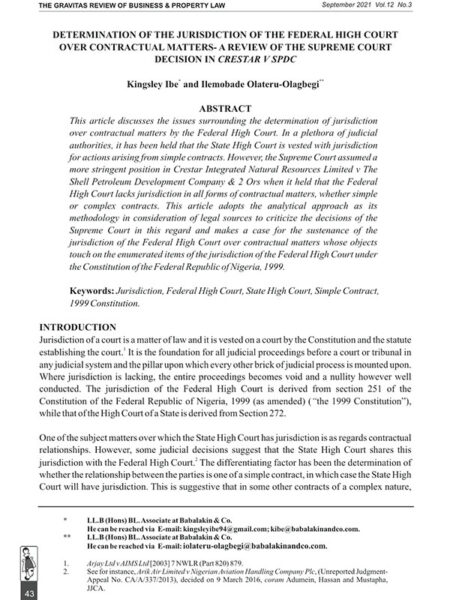
Determination of the Jurisdiction of the Federal High Court Over Contractual Matters- A Review of the Supreme Court Decision in Crestar V SPDC
0₦2,500.00Kingsley Ibe and Ilemobade Olateru-Olagbegi, both of Babalakin & Co, in their article, Determination of the Jurisdiction of the Federal High Court Over Contractual Matters- A Review of the Supreme Court Decision in Crestar V SPDC, examine the incipient confusion over the decision of the Supreme Court that a Federal High Court has no jurisdiction over contractual matters; whether the contract is simple or ‘complex’. They explore the historical jurisdiction of both States and Federal High Court on contracts, and argue that the Federal High Court should still have jurisdiction over contractual matters if the issue pertains to those items enumerated in section 251 of the 1999 Nigerian Constitution.
-
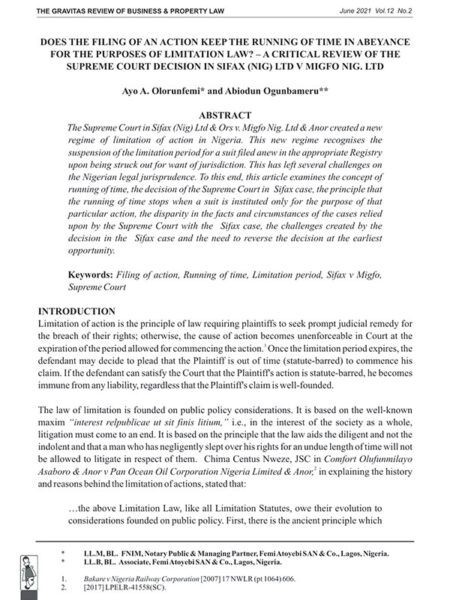
Does the Filing of an Action Keep the Running of Time in Abeyance for the Purposes of Limitation Law? – A Critical Review of the Supreme Court Decision in Sifax (Nig) Ltd v Migfo Nig. Ltd
0₦2,500.00Ayo Olorunfemi and Abiodun Ogunbameru, Managing Partner and Associate respectively at Femi Atoyebi SAN & Co in their article, Does the Filing of an Action Keep the Running of Time in Abeyance for the Purposes of Limitation Law? – A Critical Review of the Supreme Court Decision in Sifax (Nig) Ltd v Migfo Nig. Ltd, examine the new regime of limitation of action created by the Supreme Court in Sifax v Migfo and how it recognises the suspension of the limitation period for a suit filed anew in the appropriate Registry upon being struck out for want of jurisdiction. They examine the concept of the running of time, the principle that the running of time stops when a suit is instituted only for that particular action, the disparity in the facts and circumstances of the cases relied upon by the Supreme Court, and the several challenges created by the decision in the Sifax case.
-
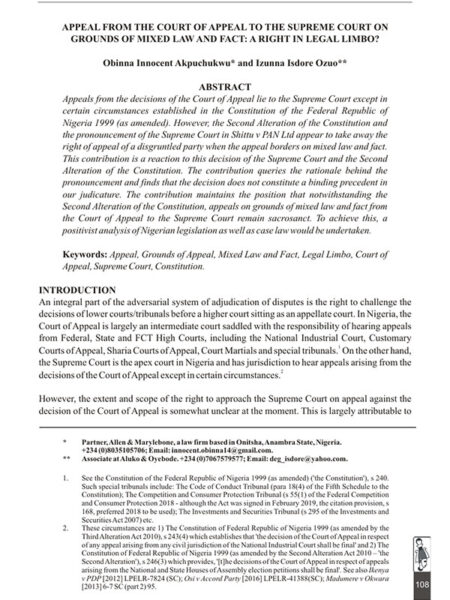
Appeal from the Court of Appeal to the Supreme Court on Grounds of Mixed Law and Fact: A Right in Legal Limbo?
0₦2,500.00Obinna Akpuchukwu, Partner Allen & Marylebone and Izunna Ozuo, Associate at Aluko & Oyebode in their article, Appeal from the Court of Appeal to the Supreme Court on Grounds of Mixed Law and Fact: A Right in Legal Limbo? note that Appeals from the decisions of the Court of Appeal lie to the Supreme Court except in certain circumstances established in the Constitution. However, a pronouncement of His Lordship Bode Rhodes-Vivour, JSC in Shittu v PAN Ltd and the Second Alteration of the Constitution appear to take away the right of appeal of an aggrieved party when the appeal borders on mixed law and fact. Obinna and Izunna query the rationale behind the pronouncement and argue that the decision does not constitute a binding precedent in Nigerian judicature. They opine that notwithstanding the Second Alteration of the Constitution, appeals on grounds of mixed law and fact from the Court of Appeal to the Supreme Court remain sacrosanct.
-
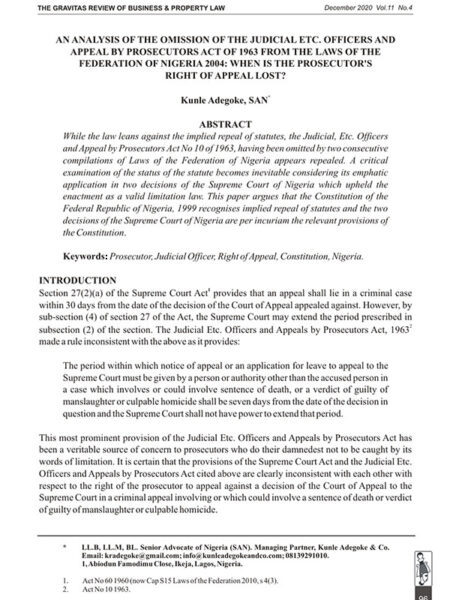
An Analysis of the Omission of the Judicial Etc. Officers and Appeal by Prosecutors Act of 1963 from the LFN 2004: When is the Prosecutor’s Right of Appeal Lost?
0₦2,500.00Kunle Adegoke, Managing Partner Kunle Adegoke & Co. in his article, An Analysis of the Omission of the Judicial Etc. Officers and Appeal by Prosecutors Act of 1963 from the LFN 2004: When is the Prosecutor’s Right of Appeal Lost?, argues that while the law leans against the implied repeal of statutes, the Judicial, Etc. Officers and Appeal by Prosecutors Act No 10 of 1963, having been omitted by two consecutive compilations of Laws of the Federation of Nigeria appears repealed. Adegoke examines the status of the statute against the background of the emphatic application of the statute in two decisions of the Supreme Court, which decisions upheld the enactment as a valid limitation law. Adegoke argues that the Constitution of the Federal Republic of Nigeria 1999 recognises implied repeal of statutes and the two decisions of the Supreme Court are per incuriam the relevant provisions of the Constitution.
-
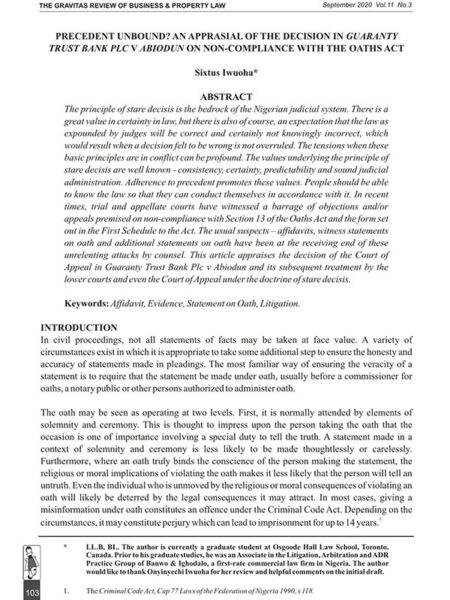
Precedent Unbound? An Appraisal of the Decision in Guaranty Trust Bank Plc V. Abiodun on Non-Compliance with the Oaths Act
0₦2,500.00Sixtus Iwuoha, formerly of Banwo & Ighodalo and now a graduate student at Osgoode Hall Law School Toronto Canada, in his article, Precedent Unbound? An Appraisal of the Decision in Guaranty Trust Bank Plc V. Abiodun on Non-Compliance with the Oaths Act, observes that in recent times, trial and appellate courts have witnessed a barrage of objections and appeals premised on non-compliance with Section 13 of the Oaths Act and the form set out in the First Schedule to the Act. The usual suspects – affidavits, witness statements on oath and additional statements on oath have been at the receiving end of these unrelenting attacks by counsel. Sixtus appraises the decision of the Court of Appeal in Guaranty Trust Bank Plc V. Abiodun and the subsequent treatment accorded to same by the lower courts and even the Court of Appeal under the doctrine of stare decisis.
-
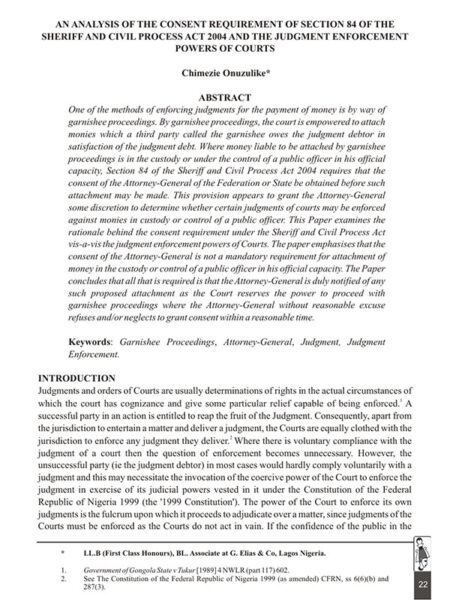
An Analysis of the Consent Requirement of Section 84 of the Sheriff and Civil Process Act 2004 and the Judgement Enforcement Power of Courts
0₦2,500.00Chimezie Onuzulike, Associate at G. Elias & Co in his article An Analysis of the Consent Requirement of Section 84 of the Sheriff and Civil Process Act 2004 and the Judgement Enforcement Power of Courts,notes that where money liable to be attached by garnishee proceedings is in the custody or under the control of a public officer in his official capacity, Section 84 of the Sheriff and Civil Process Act 2004 (SCPA) requires that the consent of the Attorney-General of the Federation or State be obtained before such attachment may be made. This appears to grant the Attorney-General some discretion to determine whether certain judgments of courts may be enforced against monies in custody or control of a public officer. Chimezie examines the rationale behind 84 SCPA vis-a-vis the sacrosanct judgment enforcement powers of the court.
-
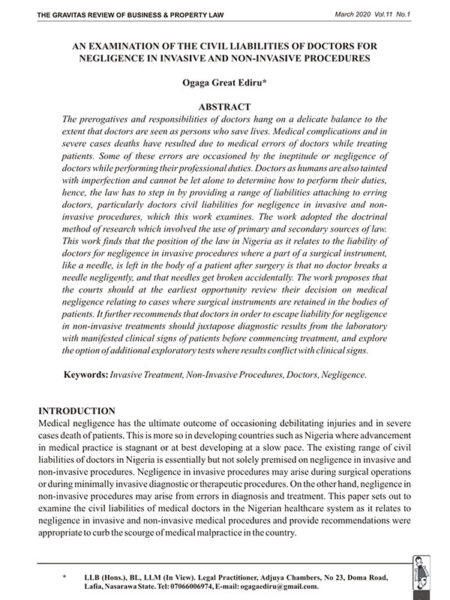
An Examination of the Civil Liabilities of Doctors for Negligence in Invasive and Non-Invasive Procedures
0₦2,500.00Ogaga Ediru of Adjuya Chambers, Lafia, Nasarawa State Nigeria in his article, An Examination of the Civil Liabilities of Doctors for Negligence in Invasive and Non-Invasive Procedures, reviews the liability of doctors for negligence while treating patients. He states that the position of the law in Nigeria as it relates to the liability of doctors for negligence in invasive procedures where a part of a surgical instrument, like a needle, is left in the body of a patient after surgery is that no doctor breaks a needle negligently, and that needles get broken accidentally. Ogaga proposes that the courts should at the earliest opportunity review their decision on medical negligence relating to cases where surgical instruments are retained in the bodies of patients. He recommends that doctors, in order to escape liability for negligence in non-invasive treatments, should juxtapose diagnostic results from the laboratory with manifested clinical signs of patients before commencing treatment, and explore the option of additional exploratory tests where results conflict with clinical signs.
The Gravitas Review of Business & Property Law



